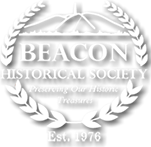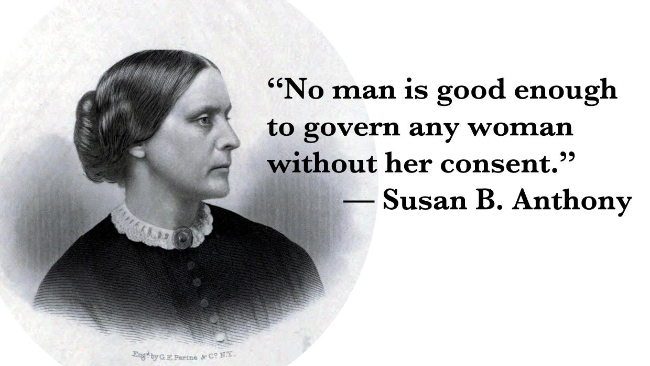Susan B. Anthony Speaks out for Women for the First Time ....
This year marks the 100th anniversary (1917-2017) of women's suffrage in New York State. One of the early leaders in the women's rights movement was Susan B. Anthony. A fateful confrontation with one of Beacon's most famous residents during a teachers' convention in 1853 was the catalyst that gave her the boost in confidence she needed thereafter to speak out on women's rights issues.
In an 1896 interview, Susan B. Anthony recollected that the other player in this verbal clash of the sexes at the convention was Professor Charles Davies of Fishkill Landing (now Beacon). Charles Davies had been an esteemed professor of mathematics at West Point (cadet Robert E. Lee--among many other famous Civil War generals to be--was one of his pupils). Davies lived on his estate "Cerro Gordo" in Fishkill Landing, where he entertained such notables as Charles Dickens (on his first American tour) and General Winfield Scott, head of the army in 1861. Historian Stephen Ambrose said of Davies: "[he] took over at West Point to become America's best-known mathematician. As a teacher and a compiler of textbooks he was unsurpassed, and most nineteenth century American boys learned everything from adding and subtracting through the calculus from a Davies text."
Anthony recalled their encounter: "In 1853, a Teachers' Convention was held. By this time, I had gained a little bit of public spirit, but not enough to speak. One man rose and said that men teachers were not respected as men in other professions were. I rose to my feet and said: 'Mr. President!' No woman's voice had ever been heard in the hall before, and everybody sat dumb with amazement. The president was professor Charles Davies of West Point, the author of several textbooks. He had on what was called a Websterian blue coat, with brass buttons. A very fine affair it was. He caught his thumbs under his arms and, coming to the side of the platform, said: 'What will the lady have?' Just as if I had fainted or something of that sort I said I wanted the privilege of saying a few words. Professor Davies said that must be at the pleasure of the convention. There were about 1000 women present and about 200 men, but it was left to the men to decide. After about a half hour's discussion on the question it was decided in my favor, but you can imagine that then my heart was up in my throat. I rose to my feet and this is what I said. I remember it word for word ... 'Do you not see that so long as society says a woman hasn't brains enough to be a lawyer, doctor, or minister, but has ample brains to be a teacher, that every man who becomes a teacher tacitly admits before Israel and the sun that he has sunk to a woman's level?' Three men came down from the platform to shake hands with me and thanked me for what I had done, but out of the 1000 women there was not 20 who were not shocked. I heard them whisper all around me, 'Who was that creature?' 'Where does she come from?' 'I was so ashamed,' said one woman, 'that I wished the floor would open and swallow me.'"
Women would have a long road to travel for equality. Unfortunately, Susan B. Anthony died in 1906, and did not see universal suffrage for women come to pass.


